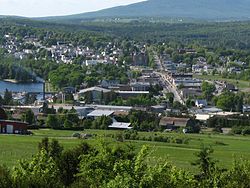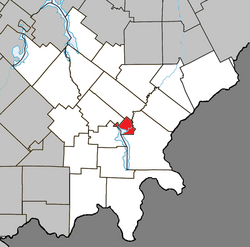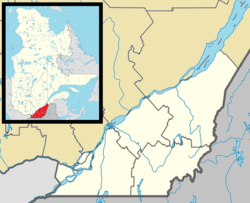Lac-Mégantic
| Lac-Mégantic | |
|---|---|
| Town | |
 |
|
 Location within Le Granit RCM. |
|
| Location in southern Quebec. | |
| Coordinates: 45°35′N 70°53′W / 45.583°N 70.883°WCoordinates: 45°35′N 70°53′W / 45.583°N 70.883°W | |
| Country |
|
| Province |
|
| Region | Estrie |
| RCM | Le Granit |
| Settled | 1884 |
| Constituted | March 14, 1907 |
| Government | |
| • Mayor | Jean-Guy Cloutier |
| • Federal riding | Mégantic—L'Érable |
| • Prov. riding | Mégantic |
| Area | |
| • Total | 25.20 km2 (9.73 sq mi) |
| • Land | 21.77 km2 (8.41 sq mi) |
| Population (2011) | |
| • Total | 5,932 |
| • Density | 272.5/km2 (706/sq mi) |
| • Pop 2006-2011 |
|
| • Dwellings | 2,938 |
| Time zone | EST (UTC−5) |
| • Summer (DST) | EDT (UTC−4) |
| Postal code(s) | G6B |
| Area code(s) | 819 |
| Highways |
|
| Website | www lac-megantic |
Lac-Mégantic is a town in the Eastern Townships region of Quebec, Canada. It is located on Lac Mégantic, a freshwater lake after which the town was named. Situated in the former Frontenac County in the historic Eastern Townships, Lac-Mégantic is the seat of Le Granit Regional County Municipality and of the judicial district of Mégantic.
Lac-Mégantic is a tourist destination and a producer of forestry products, furniture, Masonite doors, particleboard and architectural granite. In 2013, the Lac-Mégantic rail disaster led to a massive fire and deadly explosion of petroleum tank cars that devastated the downtown with considerable loss of life.
Prior to contact with Europeans, the region was inhabited by the Abenaki. Archaeological digs found that the Amerindians had been in the region for over 12,000 years, making this the oldest known site of human occupation in Quebec. The name of Mégantic comes from the Abenaki word "namesokanjik" which translates to "place where the fish are held."
The first known European to discover the region was a Catholic missionary, Father Druillettes of the Society of Jesus, who arrived in 1646. He came to convert the Abenaki.
The first colonists to settle in the region came two centuries later, around 1850, and were of French Canadian or Scottish origin.
...
Wikipedia

